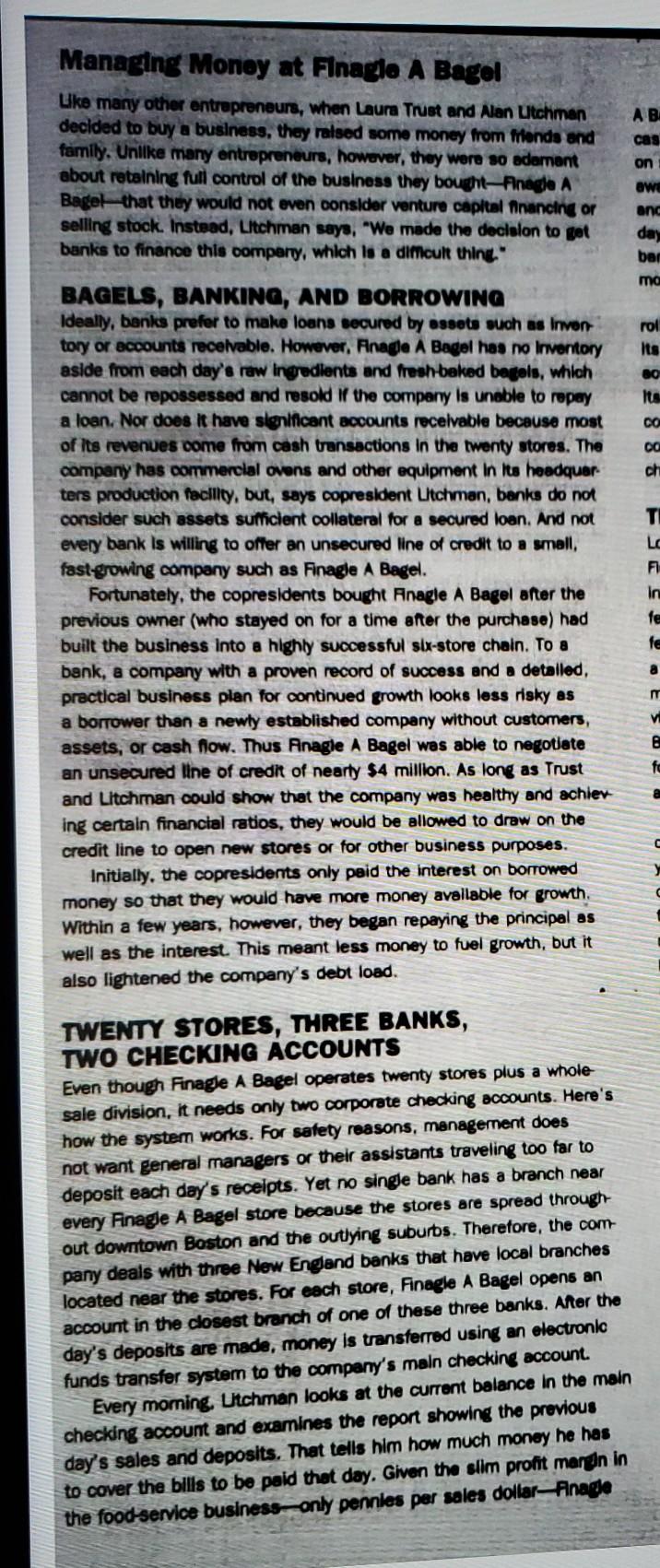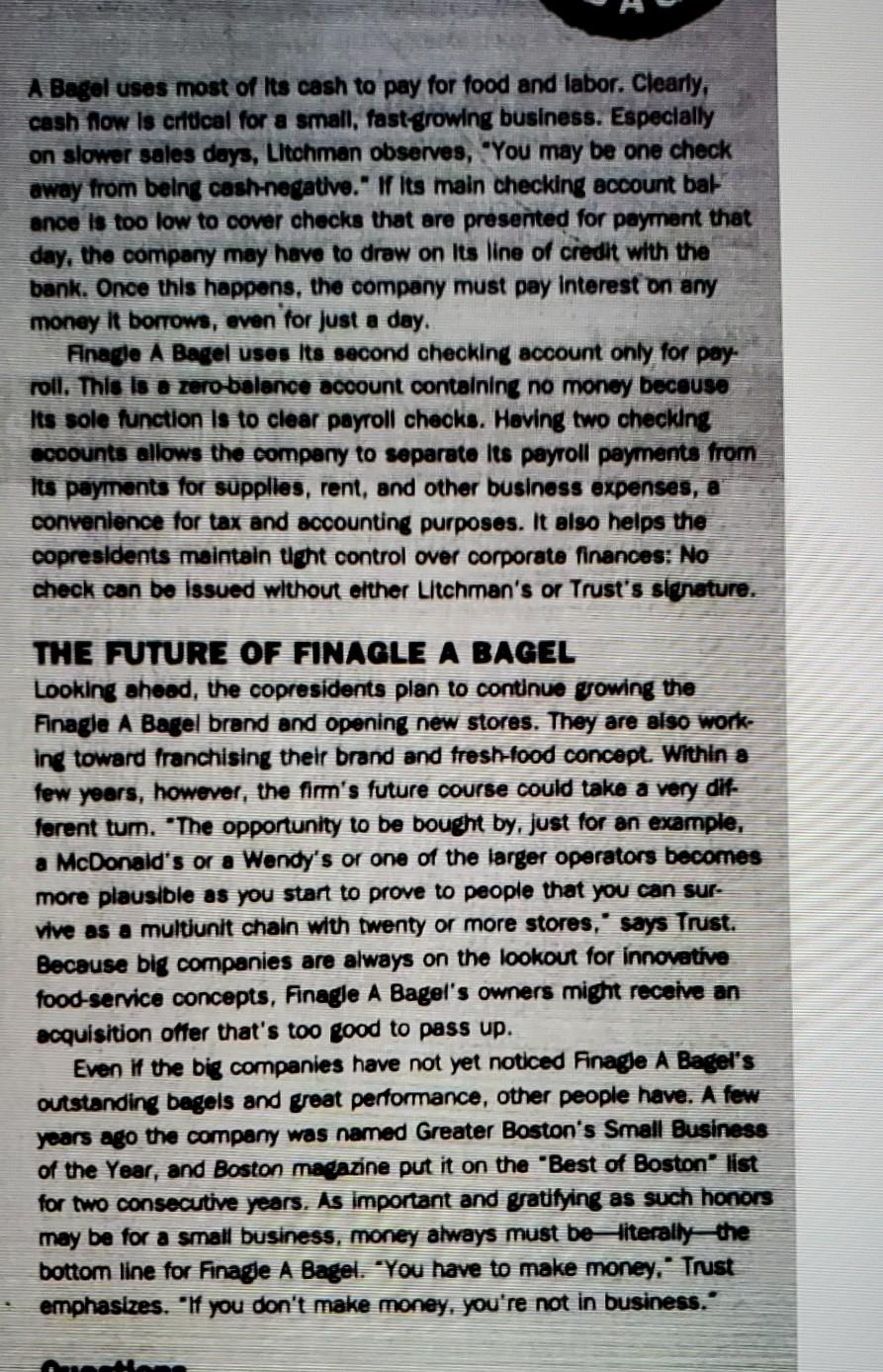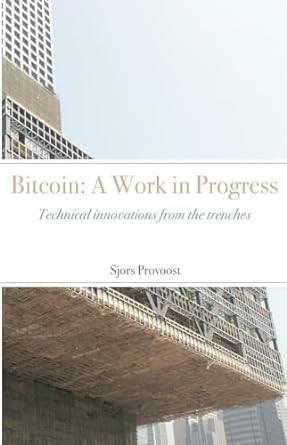Answered step by step
Verified Expert Solution
Question
1 Approved Answer
1. Given their growth plans, why would the copresidents repay principal and interest on borrowed money rather than pay interest only? Which repayment plan would
1. Given their growth plans, why would the copresidents repay principal and interest on borrowed money rather than pay interest only? Which repayment plan would Finagle A Bagels bank prefer? 2. Assuming that Finagle A Bagel decides to raise money through an IPO, what are the advantages and disadvantages of issuing stock to obtain the money needed to start or expand a business? 3.As an investor, would you be willing to buy shares in Finagle A Bagel? Explain why the companys stock would or would not be a good investment for you?


Managing Monoy at Finaglo A Bagel Like many other entrepreneurs, when Laura Trust and Alan Litchman decided to buy a business, they raised some money from friends and family. Unlike many entrepreneurs, however, they were so ademant about retaining full control of the business they bought-Fnagle A Bagel that they would not even consider venture capital financing or selling stock. Instead, Litchman says, "We made the decision to get banks to finance this company, which is a dificult thing." AB cas on we ang da bar ma rol Its 80 ca chi TI BAGELS, BANKING, AND BORROWING Ideally, banks prefer to make loans secured by assets such as Invon tory or accounts receivable. However, Anagle A Bagel has no Inventory aside from each day's raw ingredients and fresh baked bagels, which cannot be repossessed and resold if the company is unable to repay a loan. Nor does it have significant accounts receivable because most of its revenues come from cash transactions in the twenty stores. The company has commercial ovens and other equipment in its headquar- ters production facility, but, says copresident Litchman, banks do not consider such assets sufficient collateral for a secured loan. And not every bank is willing to offer an unsecured line of credit to a small, fast-growing company such as Finagle A Bagel. Fortunately, the copresidents bought Fnagle A Bagel after the previous owner (who stayed on for a time after the purchase) had built the business into a highly successful six-store chain. To a bank, a company with a proven record of success and a detailed, practical business plan for continued growth looks less risky as a borrower than a newly established company without customers, assets, or cash flow. Thus Anagle A Bagel was able to negotiate an unsecured line of credit of nearly $4 million. As long as Trust and Litchman could show that the company was healthy and achier ing certain financial ratios, they would be allowed to draw on the credit line to open new stores or for other business purposes. Initially, the copresidents only paid the interest on borrowed money so that they would have more money avellable for growth. Within a few years, however, they began repaying the principal as well as the interest. This meant less money to fuel growth, but it also lightened the company's debt load. FI in fe te a @ fo TWENTY STORES, THREE BANKS, TWO CHECKING ACCOUNTS Even though Finagle A Bagel operates twenty stores plus a whole sale division, it needs only two corporate checking accounts. Here's how the system works. For safety reasons, management does not want general managers or their assistants traveling too far to deposit each day's receipts. Yet no single bank has a branch near every Finagle A Bagel store because the stores are spread through out downtown Boston and the outlying suburbs. Therefore, the com- pany deals with three New England banks that have local branches located near the stores. For each store, Finagle A Bagel opens an account in the closest branch of one of these three banks. After the day's deposits are made, money is transferred using an electronic funds transfer system to the company's main checking account. Every moming. Utchman looks at the current balance in the main checking account and examines the report showing the previous day's sales and deposits. That tells him how much money he has to cover the bills to be paid that day. Given the slim profit margin in the food service business only pennies per sales dollar-Anagle A Bagel uses most of its cash to pay for food and labor. Clearly, cash now is critical for a small, fast growing business. Especially on slower sales days, Litohman observes, "You may be one check away from being cash-negative." If Its main checking account bal ance is too low to cover checks that are presented for payment that day, the company may have to draw on Its line of credit with the bank. Once this happens, the company must pay Interest on any money It borrows, even for Just a day. Finagle A Bagel uses its second checking account only for pay. roll. This is a zero-balance account containing no money because Its sole function is to clear payroll checks. Having two checking accounts allows the company to separate its payroll payments from its payments for supplies, rent, and other business expenses, a convenience for tax and accounting purposes. It also helps the copresidents maintain tight control over corporate finances: No check can be issued without either Litchman's or Trust's signature. THE FUTURE OF FINAGLE A BAGEL Looking ahead, the copresidents plan to continue growing the Finagle A Bagel brand and opening new stores. They are also work- ing toward franchising their brand and fresh-food concept. Within 8 few years, however, the firm's future course could take a very di- ferent tum. "The opportunity to be bought by, just for an example, a McDonald's or a Wendy's or one of the larger operators becomes more plausible as you start to prove to people that you can sur- vive as a multiunit chain with twenty or more stores,' says Trust. Because big companies are always on the lookout for innovative food-service concepts, Finagle A Bagel's owners might receive an acquisition offer that's too good to pass up. Even if the big companies have not yet noticed Finagle A Bagel's outstanding bagels and great performance, other people have. A few years ago the company was named Greater Boston's Small Business of the Year, and Boston magazine put it on the "Best of Boston" list for two consecutive years. As important and gratifying as such honors may be for a small business, money always must be literally the bottom line for Finagle A Bagel. You have to make money." Trust emphasizes. "If you don't make money, you're not in business
Step by Step Solution
There are 3 Steps involved in it
Step: 1

Get Instant Access to Expert-Tailored Solutions
See step-by-step solutions with expert insights and AI powered tools for academic success
Step: 2

Step: 3

Ace Your Homework with AI
Get the answers you need in no time with our AI-driven, step-by-step assistance
Get Started


